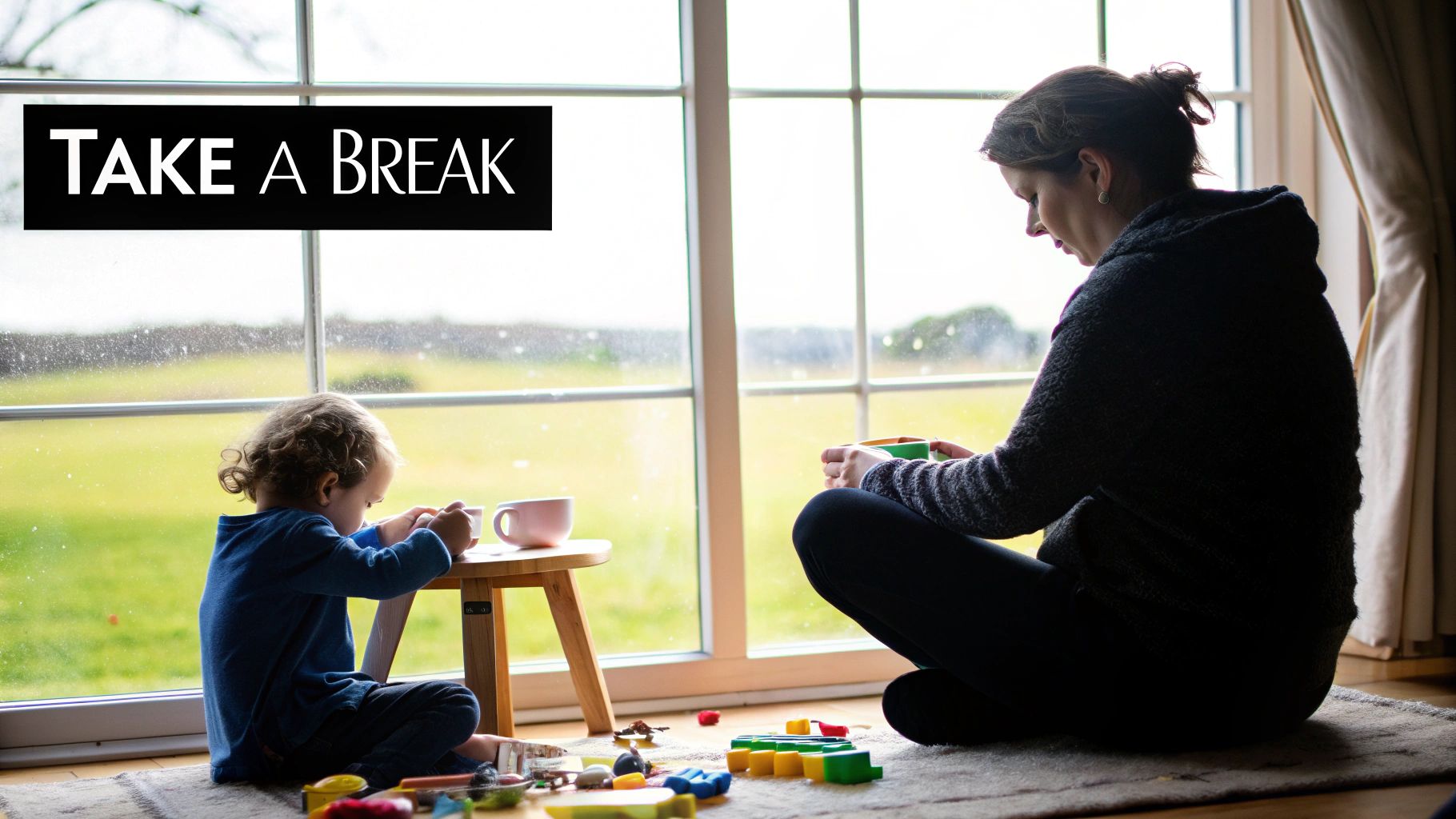7 Dad Strategies for When Parenting Is Hard in 2025
Welcome, Dad. Let's start with a universal truth: parenting is hard. It's a demanding, around-the-clock role that tests your patience, energy, and sanity, especially when you're juggling a career. For working fathers, the pressure to be a provider, a present partner, and an engaged dad can feel immense and isolating.
But here’s the crucial part: acknowledging that parenting is hard is not a sign of weakness. It's the essential first step toward building resilience and finding what truly works for your family. The goal isn't to be a "perfect" parent, which is an impossible standard. Instead, the aim is to become an effective, present, and intentional father who has the right tools for the job.
This article cuts through the noise of generic advice. We've curated a practical roundup of seven powerful, evidence-backed strategies designed to address the core challenges you face. From positive parenting techniques to the non-negotiable need for self-care, each section offers actionable insights to help you reduce burnout and cultivate a stronger, happier family life. Let’s dive into the frameworks that can transform your parenting journey from overwhelming to manageable.
1. Positive Parenting (Authoritative Approach)
Parenting is hard, and it often feels like a balancing act between being a friend and being a disciplinarian. The positive, or authoritative, parenting approach offers a powerful middle ground. It combines high levels of warmth and responsiveness with clear, firm boundaries. This method moves away from control through fear or punishment and instead focuses on building a foundation of mutual respect and emotional connection.

Pioneered by researchers like Dr. Diana Baumrind, this style recognizes that children thrive when they feel secure, heard, and guided. It’s about being a coach, not a commander. You set the rules and expectations, but you also take the time to explain the "why" behind them in a way your child can understand, fostering their own internal sense of right and wrong.
How to Implement Positive Parenting
The core principle is connection before correction. Before addressing a misbehavior, take a moment to connect with your child and validate their feelings. This doesn't mean you approve of the action, but it shows them you understand their emotional state, which makes them more receptive to your guidance.
- Use "Time-In" Instead of "Time-Out": Instead of isolating a child, a "time-in" involves sitting with them to help them process their big emotions. You can say, "You’re feeling really mad right now. Let's take some deep breaths together until you feel calm."
- Validate Emotions, Maintain Boundaries: Acknowledge what your child is feeling while holding the line on unacceptable behavior. For example, "I see you're very angry that playtime is over, but hitting is not okay. We use our words to show we're upset."
- Explain Natural Consequences: When safe, allow your child to experience the natural result of their actions. If they refuse to wear a jacket, they will feel cold on the way to the car. This teaches responsibility more effectively than an arbitrary punishment.
This approach is especially useful for working dads because it builds a strong, trusting relationship that withstands the daily pressures of work and family life. It reduces power struggles and fosters cooperation, making the time you have with your kids more peaceful and connected. Start small by focusing on one new response, like validating feelings, and build from there.
2. Self-Care and Emotional Regulation for Parents
It's a common saying that you can't pour from an empty cup, and nowhere is this truer than in parenting. The idea that parenting is hard is often amplified when you're running on fumes. Self-care and emotional regulation for parents isn't about indulgence; it's a foundational practice for maintaining the physical, emotional, and mental well-being required to be a present, patient, and effective father. It recognizes that your ability to care for your children is directly linked to how well you care for yourself.

This approach is championed by experts like Brené Brown and Dr. Kristin Neff, who emphasize that modeling healthy coping mechanisms is one of the greatest gifts you can give your children. When you manage your own stress and regulate your emotions, you're not just surviving parenthood; you're teaching your kids how to navigate life's challenges. It's about building resilience in yourself so you can foster it in them.
How to Implement Self-Care and Emotional Regulation
The core principle is the "oxygen mask" theory: secure your own well-being first before helping others. This isn't selfish, it's essential for the whole family's health. Integrating small, consistent acts of self-care into your routine prevents burnout and helps you handle stressful moments with more grace and less reactivity.
- Practice Proactive Pauses: Don't wait until you're at your breaking point. Take 10-minute breaks to meditate, listen to music, or just sit in silence. When you feel frustration rising during a tantrum, step back and take a few deep, intentional breaths before you respond.
- Schedule Your Recharge Time: Treat your self-care like a critical appointment. Put regular date nights, time with friends, or solo hobbies on the calendar. Saying "no" to extra commitments when you're overwhelmed is a powerful form of self-respect.
- Identify Your Stress Signals: Learn to recognize your personal signs of burnout, such as irritability, trouble sleeping, or feeling withdrawn. Acknowledging these signals early allows you to take corrective action before stress takes over.
This approach is vital for working dads who juggle professional demands with family life. By prioritizing your own well-being, you improve your ability to be emotionally available for your kids and partner. It reduces household tension and makes your family time more connected and joyful. To get started, you can explore more strategies and insights about dad's mental health on vibrantdad.com. Start by identifying one small, manageable self-care activity and commit to doing it this week.
3. Mindful Parenting
Parenting is hard, especially when the day’s stress meets a child’s challenging behavior. Mindful parenting is a practice that helps you navigate these moments by bringing present-moment awareness to your interactions. It's about creating a small space between your child's action and your reaction, allowing you to respond thoughtfully rather than from a place of frustration or anger. This approach focuses on observing your own emotions and your child's without immediate judgment.

Popularized by figures like Jon Kabat-Zinn and Hunter Clarke-Fields, this practice isn't about being perfectly calm all the time. It’s about accepting that strong emotions will arise in both you and your child, and learning to manage them with compassion. By staying grounded, you can see situations with more clarity and model emotional regulation for your kids, a critical life skill.
How to Implement Mindful Parenting
The core principle is to observe without judgment. This applies to your child's behavior and your own internal reactions. When you feel anger rising because your child is refusing to get ready, the first step is to simply notice that feeling: "I am feeling angry right now." This simple acknowledgment can prevent an emotional takeover.
- Take a Mindful Pause: Before responding to defiant behavior or a tantrum, take three deep breaths. This small action interrupts your automatic stress response and gives your rational brain a chance to catch up.
- Give Full, Undistracted Attention: When you’re with your kids, be fully with them. Put your phone away during the bedtime routine or dinner. This focused attention strengthens your connection and makes your child feel seen and valued.
- Practice Self-Compassion: You will inevitably have moments where you react instead of respond. Instead of beating yourself up, acknowledge it, apologize if needed, and move on. For example, "I'm sorry I raised my voice. I was feeling frustrated. Let's try again."
For busy dads, mindfulness can feel like just another task, but it actually creates more mental bandwidth. Starting with just one mindful moment a day, like paying full attention while making breakfast, can reduce the feeling of being overwhelmed. It helps you find pockets of peace amidst the chaos and build a more resilient, calm presence in your family's life.
4. Building Strong Support Networks
The old saying "it takes a village to raise a child" has never been more true, yet many parents feel more isolated than ever. Parenting is hard, and trying to handle every challenge alone can lead to burnout. Building a strong support network involves creating relationships with other parents, family, and friends who provide emotional support, practical help, and a sense of community. This network acts as a crucial safety net, reducing isolation and offering diverse perspectives when you need them most.

This concept is backed by extensive research, including Dr. Robert Waldinger's work on the Harvard Study of Adult Development, which highlights the profound impact of quality relationships on long-term well-being. A support system isn't a sign of weakness; it's a strategic resource for navigating the complexities of fatherhood. It provides a space to share struggles, celebrate wins, and simply remember you're not the only one figuring things out.
How to Build Your Support Network
The core principle is to be proactive and authentic. Strong connections don't just happen; they require intentional effort. Start by identifying potential sources of support in your life, both formal and informal, and then take small steps to cultivate those relationships. Remember that support is a two-way street; be prepared to offer help as well as receive it.
- Start with Shared Activities: Join a local parenting group, a kid-friendly sports league, or attend school events. These settings provide natural opportunities to connect with other parents who are in a similar life stage.
- Leverage Technology: If you're short on time, online parenting forums or local dad groups on social media can be invaluable. They offer a flexible way to ask questions and share experiences from home.
- Be Authentic and Vulnerable: Don't be afraid to admit when things are tough. Sharing your struggles often encourages others to do the same, creating deeper, more meaningful connections than surface-level conversations. For example, saying, "I'm really struggling with sleep training," is more effective than just "Parenting is hard."
This approach is particularly essential for working dads who might have limited time for socializing. A strong network provides practical benefits like childcare swaps and emotional benefits like having someone to call after a particularly tough day. By nurturing these connections, you build resilience for both yourself and your family. These shared experiences can lead to fun new traditions and a stronger family unit. You can discover new family bonding activities on vibrantdad.com to try with your support network.
5. Flexible Structure and Routine
Parenting is hard, and the daily chaos can feel overwhelming without a plan. A flexible structure provides a middle path between rigid, military-style schedules and complete unpredictability. This approach creates a predictable framework for daily life that helps children feel secure, while building in enough wiggle room to adapt when life inevitably throws you a curveball.
This philosophy, championed by experts like Dr. Harvey Karp and embedded in educational models like Montessori, recognizes a core truth: kids thrive on routine, but families need resilience. It's about establishing non-negotiable anchors in the day, like a consistent bedtime routine, while allowing the specific timing or details to shift. This builds a sense of order without creating stress when things don't go exactly as planned.
How to Implement a Flexible Structure
The key is to create rhythms, not rigid rules. Start by identifying the most important "tentpoles" of your family's day, like wake-up, meals, and bedtime. Focus on the sequence of events rather than the strict clock time. This gives you a predictable flow that can bend without breaking.
- Establish Anchors, Not Timetables: A bedtime routine can be "pajamas, brush teeth, read a story," which can start at 7:30 PM on a school night or 8:15 PM after a special event. The consistent sequence is what provides comfort.
- Involve Kids in Planning: Hold a brief weekly family meeting to look at the upcoming schedule. This gives children a sense of control and prepares them for any changes, like a doctor's appointment or a parent working late.
- Build in Buffer Time: If it takes 20 minutes to get out the door, plan for 30. Building in extra time prevents the frantic rush that turns minor delays into major meltdowns, for both kids and parents.
For working dads, this approach is a sanity-saver. It reduces the pressure to maintain a perfect schedule and empowers you to handle unexpected work demands or a sick child with more grace. By focusing on a reliable but adaptable family rhythm, you reduce conflict and make your time together more predictable and peaceful.
6. Age-Appropriate Expectations and Developmental Understanding
One of the biggest reasons parenting is hard is the mismatch between what we expect from our children and what they are developmentally capable of. This approach involves grounding your expectations in a solid understanding of child development, recognizing that much of what looks like misbehavior is actually just a normal, predictable stage. It’s about shifting your perspective from seeing a problem to be fixed to seeing a child who is growing and learning.
Pioneered by experts like pediatrician Dr. T. Berry Brazelton and adolescent researcher Dr. Laurence Steinberg, this method emphasizes that brain development directly drives behavior. Understanding this link allows you to respond with empathy and effective strategies instead of frustration. When you know why a toddler has tantrums or why a teenager suddenly seems secretive, you can support their growth instead of fighting against it.
How to Implement Age-Appropriate Expectations
The core principle is to see the child in front of you, not the child you expect them to be. This requires you to learn about typical developmental milestones and adjust your parenting in response. It transforms your role from enforcer to a knowledgeable guide who can anticipate needs and scaffold skills.
- Understand Toddler Tantrums: Recognize that a two-year-old’s meltdown isn't defiance; it's a sign that their still-developing brain is overwhelmed by big emotions they can't yet regulate. Your job is to be a calm anchor, not to punish the storm.
- Adjust Chore Expectations: A four-year-old might be able to put toys in a bin, but their fine motor skills aren't ready for perfectly making a bed. Match tasks to their current physical and cognitive abilities to build their confidence.
- Navigate Teenager Brains: Acknowledge that the teenage brain's prefrontal cortex (responsible for judgment and impulse control) is still under construction. This explains risky behavior and emotional intensity, allowing you to set firm boundaries while maintaining open communication.
This approach is a game-changer for busy working dads because it reduces daily friction and power struggles. By aligning your expectations with reality, you conserve energy, build a more compassionate relationship, and foster your child’s self-esteem. Start by reading a brief overview of your child’s current developmental stage to gain immediate, practical insights.
7. Effective Communication and Active Listening
One of the biggest hurdles in parenting is bridging the gap between what we say and what our kids actually hear. Effective communication and active listening are the tools that build that bridge, creating emotional safety for open, honest conversations. This approach is about more than just talking; it’s about fostering a dynamic where your child feels seen, heard, and understood, which is a fundamental reason parenting is hard but incredibly rewarding.
Pioneered by experts like Dr. Marshall Rosenberg (Nonviolent Communication) and Dr. Adele Faber and Elaine Mazlish, this method teaches parents to tune into the feelings behind a child's words. It’s a shift from directing and correcting to connecting and collaborating. By focusing on listening to understand, rather than just to reply, you build a foundation of trust that encourages your children to come to you with their problems, big or small.
How to Implement Effective Communication
The core principle is to listen with the same intensity you want to be heard with. This means putting aside distractions, getting on your child’s level, and giving them your full attention. It signals that what they have to say matters to you, strengthening your bond and making them more receptive to your guidance.
- Reflect and Validate: Before you respond, paraphrase what you heard to ensure you understand. You can say, "It sounds like you're really frustrated that you have to share your new toy." This validates their feeling without necessarily agreeing with their behavior.
- Use "I" Statements: Express your own feelings without placing blame. Instead of "You're making a mess," try "I feel stressed when I see toys all over the floor because I'm worried someone will trip." This teaches children how their actions affect others.
- Ask Open-Ended Questions: Encourage deeper conversation by avoiding yes/no questions. Ask "What was the best part of your day?" instead of "Did you have a good day?" This invites more than a one-word answer and shows genuine interest.
This approach is invaluable for working dads looking to make their time at home more meaningful. It transforms potential conflicts into opportunities for connection and problem-solving. Regular practices, like structured family meetings, can provide a dedicated space for everyone to share and feel heard. You can explore a detailed family meeting agenda on vibrantdad.com to get started. By prioritizing these skills, you create a more peaceful and cooperative family environment.
7 Essential Parenting Strategies Comparison
| Approach | Implementation Complexity 🔄 | Resource Requirements ⚡ | Expected Outcomes 📊 | Ideal Use Cases 💡 | Key Advantages ⭐ |
|---|---|---|---|---|---|
| Positive Parenting (Authoritative) | Moderate – requires consistency and patience | Moderate – time and emotional investment | Builds strong relationships, reduces behavior issues | Long-term child development, emotional growth | Strong parent-child bond, promotes self-regulation |
| Self-Care and Emotional Regulation | Low to moderate – habit building | Moderate – time, support network | Increased patience, reduced burnout | Parents needing stress relief and modeling healthy habits | Improves parental availability, models coping skills |
| Mindful Parenting | Moderate – requires regular practice | Low to moderate – time and focus | Reduced reactive behavior, improved connection | Challenging moments and emotional regulation | Enhances presence, reduces stress, promotes acceptance |
| Building Strong Support Networks | Moderate – ongoing social effort | Moderate – time and energy | Reduced isolation, practical and emotional support | Parents seeking community and diverse support | Provides varied perspectives, normalizes challenges |
| Flexible Structure and Routine | Moderate – establishing and adjusting routines | Low to moderate – planning and communication | Security, adaptability, reduces decision fatigue | Families needing balance between stability and change | Teaches resilience, creates rhythm |
| Age-Appropriate Expectations | Moderate – ongoing learning and adjustment | Low – education and observation | Reduced frustration, improved relationships | Aligning expectations with child development stages | Supports healthy development, reduces power struggles |
| Effective Communication & Active Listening | Moderate – skill development and patience | Low to moderate – consistent practice | Builds trust, reduces conflicts, improves dialogue | Enhancing family communication and emotional safety | Strengthens relationships, models communication skills |
Your Blueprint for Becoming a More Resilient Dad
Navigating the complex, demanding, and often chaotic world of fatherhood is a marathon, not a sprint. We've journeyed through seven powerful strategies designed to equip you for the challenges ahead, from implementing a Positive Parenting framework to fostering deeper connections through Mindful Parenting and Active Listening. The central message woven through each of these approaches is a vital one: you are not alone in finding this role difficult. Acknowledging that parenting is hard isn't a sign of weakness; it's the first step toward building genuine strength and resilience.
The true power of this guide lies not in mastering every strategy overnight, but in recognizing that you have a versatile toolkit at your disposal. You don't need a complete overhaul. Instead, think of this as your personal blueprint for growth.
Turning Insights into Action
Your next step is to choose just one area to focus on. Where can you make the most immediate impact?
- Feeling burnt out? Start with Self-Care and Emotional Regulation. Commit to carving out 20 minutes for yourself three times this week, even if it's just a quiet walk or listening to a podcast.
- Struggling with communication? Focus on Active Listening. The next time your child talks to you, put your phone away, make eye contact, and simply reflect their feelings back to them ("It sounds like you were really frustrated at school today").
- Overwhelmed by chaos? Implement a Flexible Structure. Work with your family to define one consistent routine, like a predictable bedtime ritual, to create an anchor in your day.
By selecting a single, manageable goal, you transform abstract concepts into tangible actions. This approach creates momentum, building your confidence as you see the positive effects on your family and your own well-being.
The Lasting Impact of Your Effort
The reason mastering these strategies is so valuable is because they do more than just help you cope. They empower you to actively shape your family's culture. You're not just getting through the tough moments; you're building a foundation of connection, respect, and emotional intelligence that will support your children long into their adult lives. Every time you pause before reacting, listen with intention, or honor your own needs, you are modeling the very resilience you hope to instill in them.
So, take a deep breath. The fact that parenting is hard simply means the work you are doing is profoundly important. Keep showing up, stay curious, and give yourself the grace to learn and adapt. You have what it takes to be the steady, engaged, and resilient father your family needs.
Ready to take the next step from surviving to thriving in fatherhood? The journey is easier with a community by your side. At Vibrant Dad, we provide resources, courses, and a supportive network specifically for fathers who want to build stronger family connections and navigate the truth that parenting is hard with confidence. Join us and discover your full potential as a dad at Vibrant Dad.






